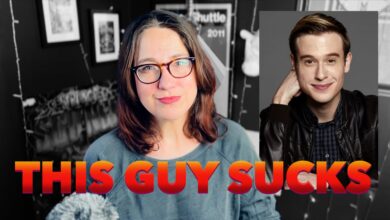The Gender Wage Gap & The “Nobel Prize” in Economics
This post contains a video, which you can also view here. To support more videos like this, head to patreon.com/rebecca!
Hey, did you guys hear who won the Nobel Prize in Economics? NOBODY. NOBODY won because the Nobel Prize in Economics DOES NOT EXIST and yes I WILL die on this pedantic hill. Alfred Nobel established five categories of prizes in his will: physics, chemistry, medicine, literature, and peace, and that’s it, but in 1968 a Swedish bank created a prize “in memory” of Nobel to be given yearly to economists, possibly as a way to launder the reputation of economists and establish them as serious scientists and not sociopaths who put a price on absolutely everything and value it over all other metrics. Tons of actual Nobel laureates, and living members of the Nobel family, HATE the economics prize and argue that Alfred Nobel would have hated it, too.
The committee that hands out the prize hasn’t exactly done themselves any favors by handing the award out to people like Milton Friedman, who created “Reaganomics,” wanted to deregulate pharmaceuticals and abolish the post office, and once famously gave lectures for the Chilean dictator Augusto Pinochet.
In 1993 they gave the award to one fo Friedman’s students, Robert Fogel, whose most famous work was about how Southern slaveholders were very rational because they benefited financially from slavery, which honestly is fine, like yeah, pointing out that they were making a profit from exploiting the labor of the people they enslaved did go against the mainstream beliefs at the time but it still isn’t exactly shocking. But in the same book he argued that because slaves made them so much money, slaveholders treated them pretty well all things considered. Like, whipping wasn’t an every day kind of thing? Anyway the reception was so bad he wrote an entire second book explaining that he definitely does not think slavery was a good thing, which is pretty funny. He was married to a Black lady, and honestly I do think he was just kind of being an economist about everything to the point where he forgot to be a human in that first book.
Anyway, this year’s award has gone to one of Fogel’s students, so, like, Milton Friedman’s intellectual grand kid, in a way: Claudia Goldin. And despite the dodgy output of some of her Chicago School forebears, I actually think Goldin is pretty cool and deserving of a big shiny award, whether it’s *technically* a Nobel Prize or not.
Even if you, like me, don’t really pay much attention to economics on a day to day basis, you may have heard of some of her research, which tends to lean more into history and sociology than pure economics. There’s at least one of her studies I’m pretty sure I’ve referenced in the past: Orchestrating Impartiality: The Impact of “Blind” Auditions on Female Musicians, published in 2000 in American Economic Review. Goldin hypothesized that women were discriminated against in orchestras, so she asked people holding real auditions to use a screen between the hiring committee and the musicians so that they couldn’t tell if they were men or women. Using the screen increased the chances that a woman would make it to the next round of auditions by 50%, and increased her chances of getting hired by severalfold.
It sounds like a relatively simple study, but the actual paper is 24 pages long with an extra 50 pages of appendices and 909 REFERENCES. Every paragraph has an entire masters thesis hiding in it, like when she randomly tosses out that in order to figure out why women were discriminated against in an orchestra, she examined rosters from 1960 to 1996, finding “that
the average female musician took 0.067 leaves per year, whereas the average male musician
took 0.061, a difference that is not statistically significant, and that their length of leave was trivially different.” She was also able to rule out tenure differences, turnover and leaves of absence. She builds an incredibly dense case for the lack of women in orchestras being due to bog standard discrimination, with music directors even stating publicly that they don’t think that women have the same level of musical skill as men.
That isn’t even her most influential work, but I hope it gives you an idea of why she won this prize: not because of one revolutionary idea or theory, but a lifetime of very careful, very detailed work in a field that had been overlooked before she came along: namely, women’s “economic value” in the workplace. Another landmark study from Goldin is “The Power of the Pill: Oral Contraceptives and Women’s Career and Marriage Decisions,” which lays out the substantial evidence for oral contraception drastically changing the lives of women in the 1970s, who suddenly gained control of their lives to the point where they could delay marriage, finish their education, and enter the workforce in droves never before seen.
But the work I find most interesting is Goldin’s 2014 study “A Grand Gender Convergence: Its Last Chapter.” For the past few decades, I’ve had men explain to me that the “gender wage gap,” in which women are paid less than men, does not exist. When presented with clear data showing it DOES exist, men have explained that it’s only because men CHOOSE to go into more lucrative fields. When presented with clear data showing the gender gap exists between women and men working the exact same job, men have explained to me that it’s only because men are more skilled and thus deserve more pay.
So it’s somewhat satisfying for a “Nobel Prize” (sort of) to go to a woman who not only proves the gender wage gap is real, but who went on to demonstrate the reasons why it exists and how society must change in order to finally close that gap, making it the “last chapter” in the story of women’s climb to equity.
Goldin previously found that as women first entered the workforce in large numbers, they DID have less education and experience, which could explain why they were paid less. But over time (thanks in part to the birth control pill!), more women completed higher education before starting their careers. As expected, that narrowed the wage gap. But, as those “explainable” factors came into play, Goldin saw that unexplainable wage discrimination drastically increased, more than doubling. Women were taking two steps forward, but employers were pushing them one step back.
Goldin presented reams of data that suggest one of the major drivers of this wage discrimination is the way employers reward longer, continuous hours worked and punish time flexibility. You might expect employees who work more hours to earn more money, but what she found was that it’s not linear. Like, at first it’s kind of like having an hourly part-time retail job. Let’s say the pay is $10 an hour, and I worked 20 hours this week and so I earned $200. But my coworker, who was hired on at the same time and supposed rate as me, worked 30 hours and somehow ended up earning $500. And next year they’re going to make even more, and even more in the years that follow, until I’m left in the dust.
Say I also want that magical extra bonus money, so I bump up to 30 hours. My coworker is working 10 hours a day three days a week, but I can’t do that because, say, I’m still in college and so I need a flexible schedule where I might work more hours on one day and fewer the next. When we get our paychecks, I only have $300 but my coworker still has $500. Why?
Goldin discovered that employers place exorbitant and non-linear value on hours worked, and they actively punish flexibility. This explains why men and women tend to enter the labor force with no wage gap, but over time that gap widens, particularly around the time that those women begin having children. They must leave work to actually give birth, and then if they return to work months later they’re punished with lower pay. If they work fewer hours to spend more time raising their child, they’re punished again. If they work the same number of hours as their male colleagues but now need a more flexible schedule due to being the primary person running the household, they’re punished yet again.
As an economist, Goldin’s proposed solution to all of this isn’t “men should probably step up to help raise their kids” or “the government should mandate and enforce salary transparency.” Her solution is instead an economical one: women being underpaid makes the entire economy less efficient, and so employers (and everyone else) would theoretically benefit by no longer punishing flexibility and over-rewarding total hours worked above all else.
This is all particularly interesting right now, when employers are fighting tooth and nail against the work from home movement that started with the COVID pandemic. Many employees say they’re happier working from home, that they’re more productive, that working from home saves the employer money on keeping offices full of computers and air conditioning, and that they now have more flexibility to adjust their hours around the needs of their families. Meanwhile, employers say work from home is bad actually, for…reasons.
Goldin’s research makes me wonder– if employers embraced work from home, would that be the start of the “final chapter” of the wage gap? And would it just make us all happier?
Like work from home, flexible job hours aren’t for every career. There will always be jobs you can’t do from your sofa, and there will always be jobs that by definition require a set schedule and long hours. But Goldin points out that there are a huge number of jobs that could be made more flexible, and that don’t require 60, or even 40, hours of work each week. We just need employers to realize how much they would actually benefit.
But while we’re waiting on that…maybe some male responsibility and government mandates might be nice?
As always, there’s a link in the doobly doo below that will take you to a free transcript of this video on my Patreon with links to everything I’ve talked about today. If I’ve piqued your interest, you should check out a few of Goldin’s papers, which are available in full for free online. Or, check out the “Scientific Background” paper published by the ersatz Nobel committee, also free online.




